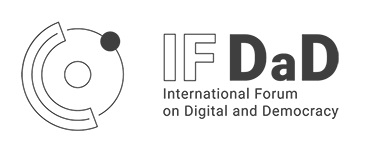Since the first edition of the Forum, in December 2020, the stretching of pandemic control measures constrained furthermore individual freedoms. In some cases, it provided legitimacy to authoritarian shift in frail democratic governance. According to Democracy Index in 2021 global democracy continued its decline and experienced its biggest annual drop since 2010 after the global financial crisis. Whereas even the United States, the stronghold of democracy, in occasion of the Capitol attack, showed to be unshielded to the outburst of illiberal forces.
For fragile democracies difficult times lie ahead. However, if the spirit of democracy and its needs remains strong among people, recovery hopes are also to be placed in the righteous use of digital technologies.
The expected outcome of the Forum is to gain a greater understanding and shared view on how digital technologies can positively affect electoral process and pluralism. As a follow-up of the debate of the first edition, the Forum will explore and develop the interplay between digital technology and data, political participation, and governance. Altogether with two additional focus: the functioning of eGovernment and disinformation.
CALL FOR PAPERS
Internet and algorithms caused a transformation of the centennials democratic processes. When exploited for political purposes digital tools affect the functioning of institutions created to evolve at human speed and not at the exponential pace and massive scale of digital technologies.
In the effort to gain a better understanding on how democracy can be strengthened in an era of rapid technological changes, the Forum engages scholars and experts in a Call for Papers on one of the following areas:
1. Technology plays a major role in shaping the political landscape
How technology can be positively deployed to underpin political institutions.
How can an equitable access to technology be ensured?
How can digital technology encourage greater engagement in civil society?
2. The effects of the new `algorithmic power` of States on citizen`s rights and on the Rule of law
Do Constitutional States need to implement new guarantees in the algorithmic society?
Centralized control from the public administration software/data represents a dominant power that could lead to abuse of people`s live scrutiny: from Surveillance Capitalism (GAFA) to Surveillance eGovernment. How should eGovernment systems be designed and deployed to be compliant with democratic principles?
Can well-designed digital tools enhance liberal values and build up democratic participation in an algorithmic society?
What kind of organizational and procedural oversight and accountability measures should be envisioned in a digital bureaucracy?
3. Technology-fueled disinformation has toxic societal impact on democratic political culture, providing severe polarization which damages all institutions essential to democracy
Are social media to be considered a private space or a public service?
How to fine tune them to secure free and confidential communications?
Does content moderation affect freedom of expression?
Can online moderation of social platforms improve the wellness of digital communities?
IMPORTANT DATES
Paper submission deadline: Extended until August 31st 2022
Notification: October 15th 2022
Camera-ready: November 1st 2022
In case of any events such as Covid-19 travel restriction imposing the cancellation of the venue, 2022 IFDaD program would be all the same held by videoconferencing.


社群連結